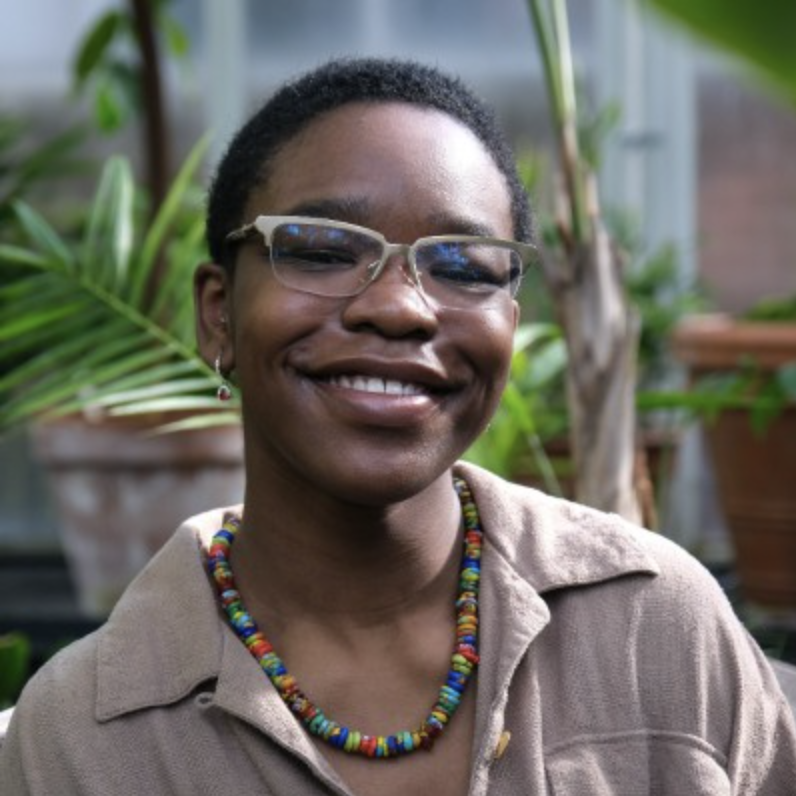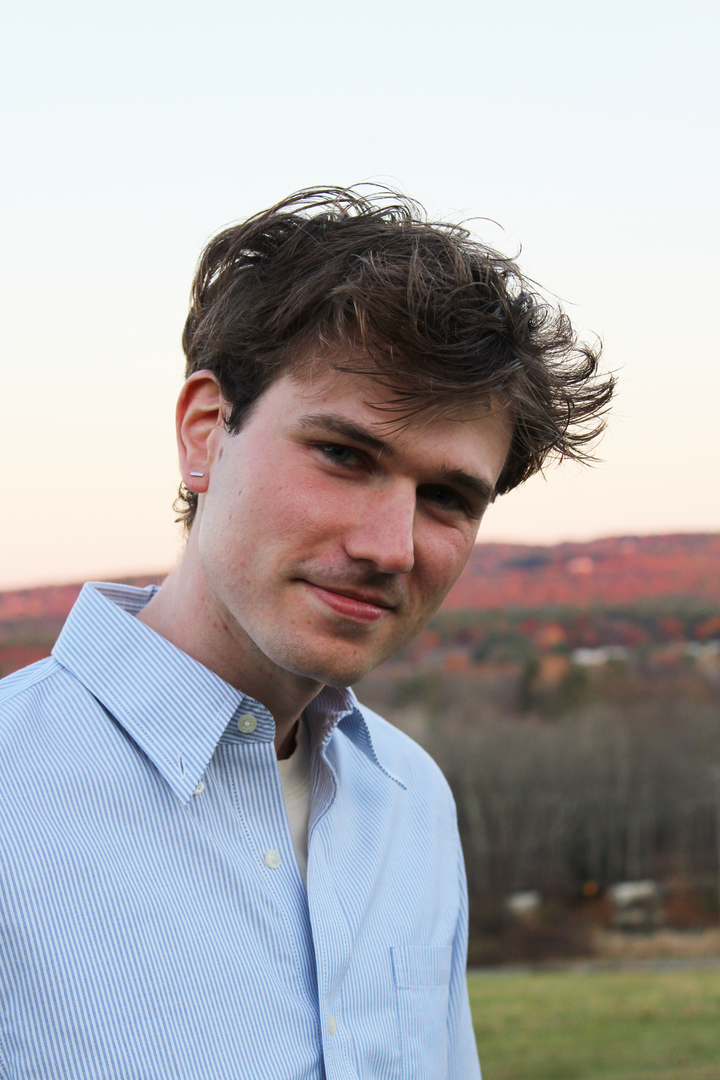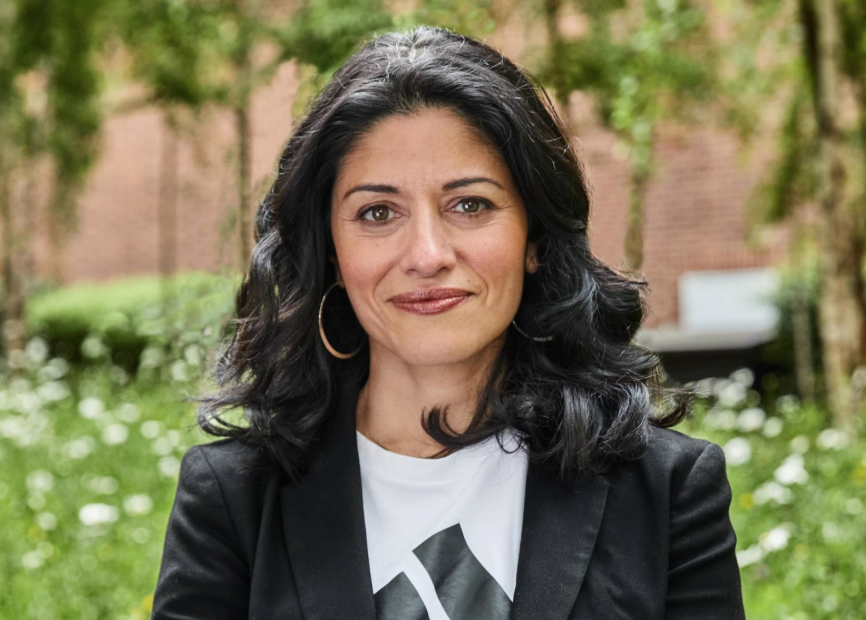Staff Spotlight: Iris Afantchao
In this edition of Staff Spotlight, Editor-in-Chief June Dorsch ’27 sat down with Iris Afantchao, Frost Library’s Acquisitions Specialist, to learn more about a career in the archives, surprising book requests, and faculty-staff field trips.

Q: Let’s start off with a brief introduction to Iris.
A: I’ve been at Amherst for a year and a half. I just finished my library degree in December. I grew up in Connecticut — in Windsor — not too far from here. I’m 26 years old.
Q: As a kid, were you always interested in books and reading and all those types of things?
A: I definitely was. I was someone who would go to the library. [I went with] a lot of my friends on half days after school, as I was getting older. But [I] never really thought about working in the library. It [was] just a place that I really spent a lot of time at and valued. I didn’t really think about working in libraries or archives until college.
Q: What happened in college that made you realize, “Oh, this is for me”?
A: Well, I knew I didn’t really want to study history, but I also really liked getting to learn about history. So I was just trying to fill a credit, and there was a lecture series about the archives that was at a good time for me. So I picked that, and when I started going, I was like, “Oh, these are the ways that I actually like to apply what I’ve learned [from] history class or … a museum …” So I kind of just kept poking around to see what archives people could work at. And there’s a book for pretty much every topic, there’s an archive or some type of collection out there for pretty much anything you’re interested in. I just kind of kept exploring from there and became a student worker in Smith’s Archives and Special Collections.
Q: What was working in the archives like? What intrigued you?
A: A lot of the stuff that I realized I found the most interesting were just the things that people were calling for on any random shift, and then I’m like, “I would never have known to even request that. How did we get this?”
Q: I work in the archives at Amherst, and it’s always fun when there’s a random thing, and you’re like, “I didn’t even realize we had this,” and then there’s a new interest you could get into.
A: Or things that are, like, super oversized that you wouldn’t bother to even pull out. Because you’re like, “It looks like it takes two or three people to get this.” And then one day, someone asks for it, and you’re like, “Okay, well. Now I have a chance to find out what’s over here.”
Q: If you weren’t doing library work, what do you think you would be doing?
A: I don’t know, I almost want to say I would work [in] government. But my first year of college was during the 2016 election, so that changed my mind about that then … maybe I’d be in journalism. I don’t know.
Q: Were you interested in government before you came to college?
A: Yeah, I thought so, [or] working in journalism. But my history professor was like, “Journalism is dying. You should not do that right now.” And it scared me enough to not do it. But there are lots of people [where] librarianship is their second career, or archives is their second career. I know Cat [Hannula] — one of the [research and instruction] (R&I) librarians — she used to be a journalist and then became a librarian. So sometimes people do this first, sometimes it’s like the second or third thing, but all the knowledge still matters. It’s just used pretty differently.
Q: How did you end up at Amherst?
A: I was a post-bacc fellow in Smith’s Archives and Special Collections. And then I stayed on for a while longer, working on the desk there, and after [that], it [was] time for me to go do something else. And I was still in the middle of grad school too, so I was like, “If I can help it, I don’t want to have to do a really big move while I’m still in the middle of that.” So then I saw that Amherst was also looking for people to join the library, so I thought I’d try. And some other people who used to work in the libraries at Smith also … started working here so it was nice to be able to ask them how they’re doing and how working here feels ... before I decided to apply.
Q: Describe your job. What does a day in the life look like for you?
A: For me, I’m getting the request[s] for book purchases that students and faculty and staff [put in] — whether it’s asking if a book is available at the desk, or looking for it in the catalog, and then realizing that we don’t have it; or things like course reserves, making sure that when they decide what they want the readings or films to be for the semester, that we can actually get them and have them in a way that can be hosted for everybody. I usually get the request, try to look for it through our usual vendors or bookshops or databases and if [it’s] not [there], then I usually am going back and forth with [Interlibrary Loan] to see if we can still get someone what they need in a timely fashion by borrowing it …
It’s interesting to see all the different things that people have to read or watch for their classes … I feel like I’m getting an idea of what everyone’s up to, but it’s kind of removed because … it’s not really a position where I’m on the desk anymore …
Q: What is the most surprising thing you got a request for?
A: I would say some of the books that I purchase for Archives and Special Collections because they tend to get books that are either made of interesting materials or have weird shapes, like different artist books. Or sometimes it’s just silly stuff I used to watch that gets requested for a class. One example was I had a little bit more trouble than I thought I would trying to track down that MTV show that used to be on — “Wildboyz,” the spinoff of “Jackass.” Like, why are they watching this? And what kind of assignment could you make up with this? It’s just something I watch[ed] after school and [paid] no mind to … And now there’s something that could be put in a lesson about this …
Q: Do you end up interacting with a lot of people, or is it an on-your-computer type of thing?
A: This is the most computer-based library job I’ve ever had. I feel like on a normal day, I don’t really need to talk with many people in person. But it is still a job where I need to check in with folks who are working access [services] — who are usually the folks you see [at] the front desk — or talking with the R&I librarians — who you would usually like have a class with — to get a better idea of what people are needing, and where there are gaps between what people need and what we already have in our resources …
It’s a lot of getting information from other people, less so checking in with students and faculty themselves … I do miss that part about having that built into what I have to do on the daily, but I’ve still been able to find events and things on campus where I can kind of get a better idea of what’s going on.
Q: What are some of those events?
A: I just went to the author talk with Hanif [Abdurraqib]. It was really good. [Also] the events that tend to get hosted at the library … just having a chance to walk by them, even if I can’t attend. Or seeing what students are making displays for has also been interesting. This is a smaller thing, but the Office of Sustainability hosts monthly faculty-staff field trips. The other month, it was going to the sugar shack [at] Book and Plow Farm and seeing how students were making their own maple syrup … I saw the trees tapped before, but wasn’t really sure what was going on. So that was just cool to learn about what’s going on in one small corner of campus.
Q: Do you think that working in the library has impacted how you read in your free time?
A: I mean, as someone who was working and doing school at the same time for all of grad school, and going into it not long after undergrad — which ended on a weird note in 2020 … I’ve only just now gotten to a point where I can start to read for fun again. And not be as worried about what it means to select a certain book because it’s not for someone else, it’s for me.





Comments ()